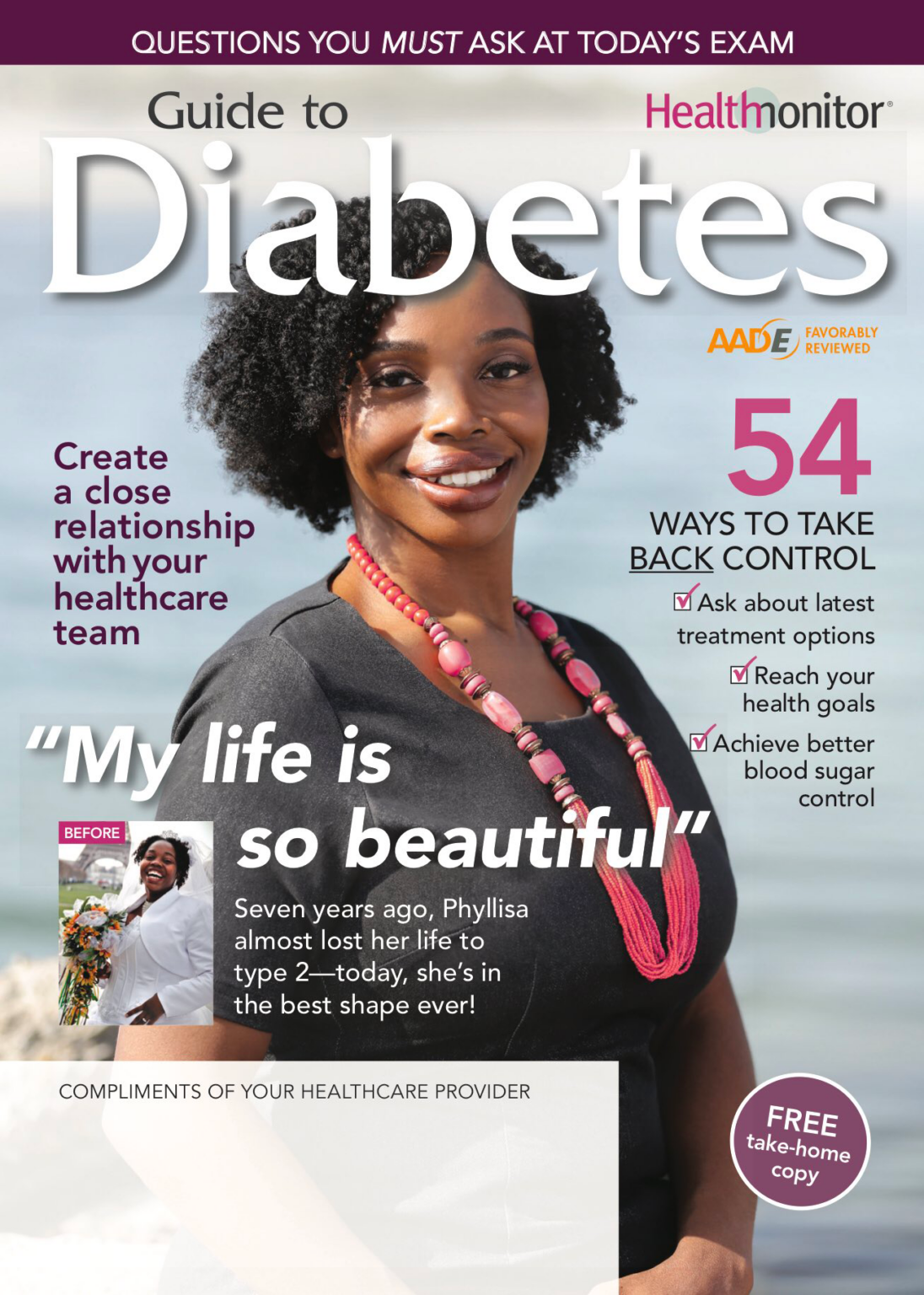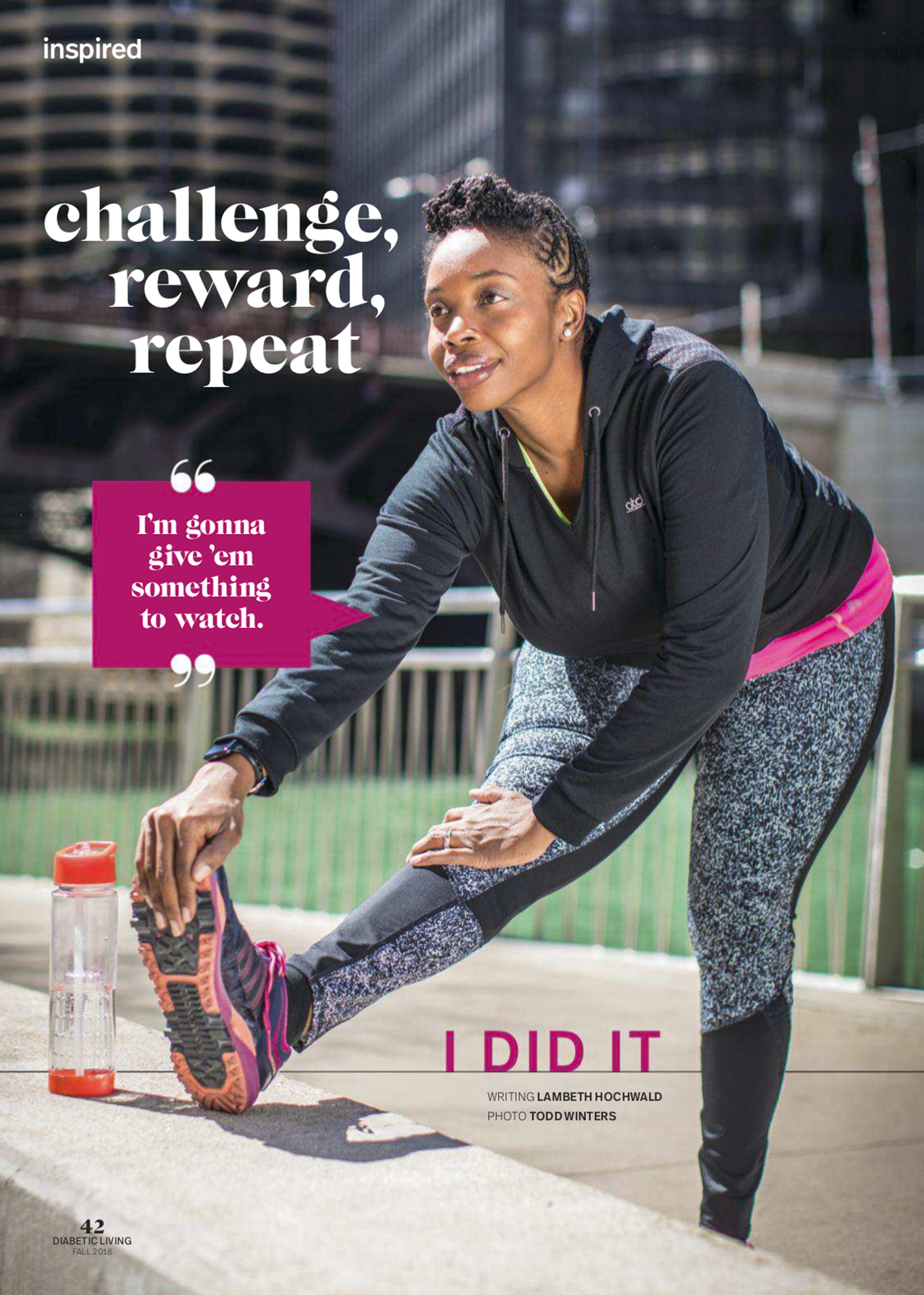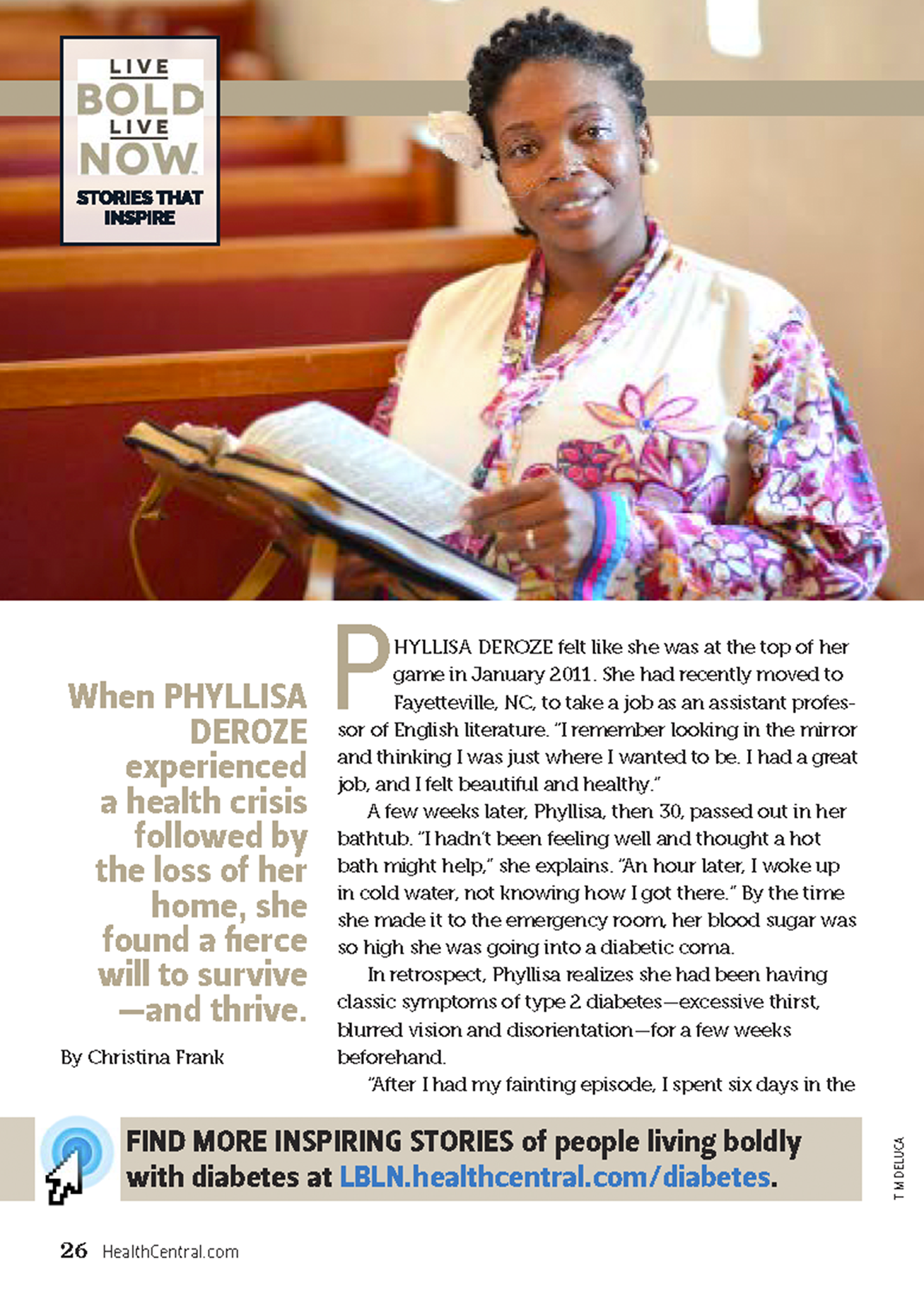I held back the tears until I exited the office and got into my car. But, once I plopped in the driver’s seat–I cried. Last month, I had the worst medical visit of my diabetic life.
My Endocrinologist (the one that I raved about during my DMSA interview) was out of town and I had to see his assistant. I felt pretty good about going for my 3-month A1C check-up to chart just how well I’ve been doing. But things quickly went sour.
When the PA walked into the room she shook my hand and said, “Hello I’m Dr. ____’s PA. My name is Ms. ____, I don’t think we’ve met before.” I replied, “No we haven’t. I’m–” Before I could get my name out she had moved on to the table, opened my chart, and started asking “Do you have a history of Diabetes?”
I couldn’t believe that this woman had not even waited to hear my name. If my name doesn’t matter, then do I? If she’s more interested in seeing the chart than looking into my eyes then how can she care for me? This was the first problem and shortly afterwards came the second.
“Do you have a history of Diabetes?” she asked again, snapping me out my thinking process of examining how rude she just treated me.
“I have Diabetes,” I said.
She looked up from the chart and turned to me and asked again, “Do you have a history of Diabetes?”
Thinking that she probably has a hearing problem, I said more clearly and more detailed, “I was diagnosed with Diabetes last year on February 15th.”
“Yes, but I’m asking if you have a history of Diabetes?” She said firmly.
Okay, so now I’m wondering what her problem is but, then I figure, maybe we’re being lost in translation since her accent tells me that she not native-born American. Could she be asking me if I have a family history of Diabetes? “I don’t have a family history of Diabetes. I am the only Diabetic in my family.”
Apparently agitated, she responds “I am not asking if you have family history of Diabetes, I am asking if you have history of Diabetes.”
So, now I’m looking at her like she really is a complete idiot. Just before I could reply the nurse walked in to give the PA something. And I could tell that the nurse recognized that something was wrong me, but she closed the door almost as silently as she opened it.
I spoke, “I told you that I’m Diabetic. I am at the Endocrinologist’s office. I was diagnosed with Diabetes last year on February 15th. No one in my family is Diabetic except for me. If you call being diagnosed with Diabetes for a year a history, then yes.”
“Well, you have Diabetes, correct?” She asked.
“Yes.”
“Then you have a history of Diabetes.”
I was moved from being aggravated to borderline pissed off since that whole segment was about 10 minutes. Plus, who in the world asks a Diabetic if you have a “history of diabetes”–you either HAVE Diabetes or you don’t. And, the first thing I said was “I have Diabetes.”
We both attempted to move forward. But even in moving forward the clashes kept coming. She made me feel less than. And it wasn’t until I told her that I was Dr. P. a professor at the local university that her attitude changed. It was as if there was a new PA in the room when she found out that I have more education than she does (a PA in grad school trying to finish her dissertation). All of a sudden she seemed almost hopeful that this commonality would bond us. Sorry, chick.
It made me cross the borderline to being pissed off. Why? Because I thought about the countless people that come into this office that don’t have college degrees. The ones, like in my own family, that can’t demand that she call them Doctor. I thought how sad it was that for 15 minutes I was being perceived as less than now all of a sudden she wants to value me. I thought about the level of arrogance she must have to treat people like this and feel that it’s okay. I wondered how far I would be in my Diabetes management had I met her rather than my fabulous Endocrinologist when I was in the hospital and scared to death that I was less than 24hrs away from a Diabetic coma. I knew that I would probably still be on medication–either for being an experiment for her dissertation or because of her terrible attitude and unfriendly approach making me have a lackluster approach to Diabetes management.
That wasn’t where things ended, either. Next up was my prescription for strips. I requested strips for testing 3 times a day. She said, “I will only write for once a day.”
“What? Once a day is nothing. I test when I wake up in the morning, test before I go to the gym, and then after I workout,” I responded quickly.
“The insurance companies will look at this chart and then ask why are you testing 3 times a day if you’re numbers are in good range.”
“What numbers will they look at?”
“These. The ones in the chart?”
“Are you talking about the ones that the nurse just got from my glucometer?”
“Yes”
That’s when I informed her, “In order for the insurance company to know that I’m in normal range means that I’ve been testing 3 times a day and have data to show them. Even you asked how are my numbers in the morning, at lunch, and before bed? If I am only testing once a day, I won’t know what my numbers are, can’t tell you, and the insurance company won’t know either. Can you write in my chart that I am going to the gym and need to test before I work out?”
“I can’t do that. They aren’t going to care. They are just going to see you have good numbers and not want to pay for testing that often.”
I felt like crying then because at this point I’m SO OVER all the clashes from this visit. But I say,
“Look. I run the risk of passing out if I am low before working out. That is the reason why I wear a medical alert bracelet. Testing at least 3 times a day is what has gotten me to be a med-free diabetic and in order to stay med-free, I need to know what my levels are.”
She simply could care less. Whatever else came out of her mouth on the subject of strips was a blur because she was not budging. The idea of writing the prescription and letting me hash it out with the insurance company also did not waiver her stance.
I thought about all of that. And before the visit was even over, we had yet another clash. This time, about getting the results of my A1C. I asked, “If I call you next week, will you be able to give me the results of my A1C?”
“I don’t usually give results over the phone,” she said.
“Well, I’m going to China at the end of this week, so if you could make an exception, I would appreciate it,” I asked.
“Your numbers are good. You look fit. You tell me you’re working out regularly. I don’t foresee a change in your numbers. And, even if there were we couldn’t make changes until you returned anyway.”
I knew that any more comments would return us to the beginning of the conversation. And I would rather leave on a better note. I simply said “Okay” but I had resolved that I would NEVER go back to that office if my Endocrinologist is out of town. I left the office so hurt, aggravated, and angry that I released all my frustrations out through my tears in the parking lot and on the drive home.
I am not sure what’s going to happen in the future but I will NEVER EVER go back to see that woman again.
_______________________
Here are my 5 suggestions:
#1-Remember that a greeting goes two ways. If you want me to hear who you are, then listen to me when I tell you who I am.
#2-Asking a diabetic if they have a “history of diabetes” is an assassin question. The proper question is “Are you a Diabetic?”
#3-Treat all your patients like they are someone’s child or mother. If you’re having a bad day-stay home. Your patients have a life on top of managing a chronic illness…the last thing they need added to their day is your nasty attitude.
#4-Patients don’t want to see or hear about the way(s) you’re compromising our health to bow down to insurance companies.
#5-If you don’t have a chronic illness, then you can’t imagine the fear, vulnerability, uncertainty, and layers of emotions your patients experience every single day. Never forget that we are fragile and when we come to you we are perhaps at our most vulnerable state because we’re sharing information with you that we may not share with anyone else. So, be gentle.





Now I can understand why you haven't posted for a while. This is a common problem for many of us with type 2 diabetes. They just do not want us to test. My belief is that they do not want us to know what the whole grains and carbohydrates they try to get us to eat is doing to our bodies.
Keep fighting the good fight. I can appreciate how you felt since this assistant obviously did not look at your records before she saw you and was clueless as to your reason for visiting the office. Your endo may not want to hear what you tell her at your next appointment, but you should be prepared and maybe have it typed out about your reactions to her assistant – maybe even to the point of a formal complaint.
For test strips you may have to contact the insurance company, but I don't hold out much hope as many insurance companies are following the lead of medicare lock step. Be prepared to spend you hard-earned money for test strips.
Thanks Bob.
Yeah, I might have to let my Endo know what happened. He's the opposite of his assistant (he's friendly and makes all his patients feel welcomed).
As far as the strips…Yep. I've already had to pay out of pocket twice so far.
Hi, Dr. P. So sorry to read about your experience. And to know that this kind of things happens to too many people, far too often in our current health care system. Thanks for writing about it. Please know that your discomfort, frustration, and anger are, somehow, someway, powering change.
Thanks for your kind words Kelly.
Hello Dr. P. I'm sorry to hear about your bad experience as well. My mother raised me never to hit a woman. But the more I read about your experience. The more I wanted to punch her in the mouth, because you are right, those of lesser intelligence are simply victimize due to her arrogance. And I hope you do file a formal complaint against her and I will be willing to bet that it won't be the first one. You never know. It may bring her down to earth and forced to reevaluate her actions. The advice you gave me about my wife lets me know that you are good people and one thing I can't stand is good people being taken advantage of. So you take care and remember you are in control of this situation, not her. :-)
Wow!!! Wow, I don't know what to say. That is probably the WORST appointment I've ever read about. I hope you find a way to let your regular endo know – I mean, not in a tattletale way, of course, but I'm sure your doctor would appreciate knowing his assistant wasn't giving the level of care he does!
This is an example of why I avoid ALL Drs except my Endo.
You need to let your Dr know how clueless his employees are
Hey Dr. P! Long time no speak. My goodness that was a terrible visit!! Obviously the PA is someone with no people (counseling) skills whatsoever. I agree with others who have encouraged you to speak to your endo about the visit. Most physicians care about their patients. They want to know that those to whom they entrust with your care are doing just that – caring for their patients.
Be well….
Thanks, Robert.
I didn't know how to process it for weeks, Karen. Your suggestion is a good one.
Yeah, you're right. I'll send him the link.
Thanks Ms. Brown-Riggs. I will inform my Endo. They are clearly night and day from each other.
OMG Dr. P! I could hear the frustration in your “voice” and I encourage you and have the utmost confidence in your ability to be professional and diplomatic, especially with your PhD in English lit, to expose this ineffective PA and avoid any further degredations towards other patients in the future! You have so much going for you and I am certain you have the power to make a difference for yourself and for others to see that future injustices are avoided.
With the HIPPA laws in effect now, all patients have a right to get immediate feedback on the results of the tests done on them and you know it is part of the plan in maintenance. This is a non-negotiable expectation by a patient and an obligation by the medical administrators.
I find it ironic that we are both educators and diagnosed with diabetes in the same month and the same year! The only difference is that the NYCDoE was the cause of my stress and ill health so I left and redirected my pedagogical efforts to became a Health Coach and advise adults at my local gym on nutrition.
I also work out frequently, and find that by carrying a small can of V-8 with me, this drink covers any sort of sugar lows I may experience after exercising, and slowly and safely my sugar level become more balanced once again.
Initially, I was checking my blood sugar levels after every meal and after exercising, and as a result, I too had to purchase extra testing strips and pay for them out of my own pocket. However, after studying more about healthy eating practices in addition to exercising regularly, I basically now know how to keep my sugar levels in check. Specifically, by keeping a journal during my first year of diagnosis, I became more aware of what to eat, how much to eat, when to eat, as well as, how to handle any sort of lows (V-8) or highs (water) in between.
Thanks for sharing your experiences with us, Dr. P. I hope I have also given you some additional input for more positive experiences in the future.
Camille LoParrino, Health Coach
http://www.happymediumensemble.net
Thank you so much Camille, I will do my best to get the results of my A1C.